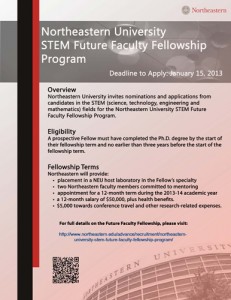
Northeastern University invites nominations and applications from candidates in the STEM (science, technology, engineering and mathematics) fields for the Northeastern University STEM Future Faculty Fellowship Program.
Northeastern University’s mission emphasizes translational research that addresses global challenges and enhances social well being. Northeastern University strives to create a vibrant and diverse community, characterized by collaboration, creativity, and unwavering commitment to excellence and an equally unwavering commitment to exhibiting respect for one another. Northeastern celebrates diversity in all its forms and fosters a culture of respect that affirms inter-group relations and builds community.
Consistent with Northeastern’s mission, vision and core values, the objectives of the STEM Future Faculty fellowship program are:
- to encourage and promote excellence and diversity in the pool of future faculty candidates in the STEM fields at Northeastern;
- to introduce to Northeastern’s academic community qualified postdoctoral researchers in the STEM fields who are considering faculty careers;
- to enhance opportunities for academic careers in the STEM fields for persons from diverse backgrounds who have demonstrated a commitment to an inclusive faculty and an inclusive academic experience for all students;
- to prepare Future Faculty Fellows for possible tenure-track appointments at Northeastern;
- to enhance the academic environment of Northeastern’s STEM fields by providing opportunities for students and faculty to gain experience in multi-cultural, broadly diverse and inclusive work settings and research collaborations that improve the capacity of all their members.
Information about eligibility, fellowship terms, and application information can be found online at: http://www.northeastern.edu/advance/recruitment/northeastern-university-stem-future-faculty-fellowship-program/ The deadline to apply is January 15, 2013.